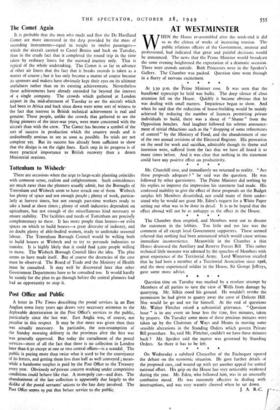W HEN the House re-assembled after the week-end it did so
as the climax of weeks of increasing tension. The public relations officers of the Government, amateur and professional, had indicated that great and painful decisions would be announced. The news that the Prime Minister would broadcast the same evening heightened the expectation of a dramatic occasion. There were crowds outside. Both Princesses were in the Speaker's Gallery. The Chamber was packed. Question time went through in a flurry of nervous excitement.
* * * * 1.
At 3.3o p.m. the Prime Minister rose. It was seen that the bundlecof typescript he held was bulky. The deep silence of close attention fell on the House. Quickly it became obvious that he was dealing with small matters. Impatience began to show. And when he said that the reduction of house-building would be mainly achieved by reducing the number of licences permitting private individuals to build, there was a shout of " Shame " from the Opposition benches. And laughter followed his solemn announce- ment of trivial reductions such as the " dropping of some refinements of control " by the Ministry of Food, and the abandonment of one of the two annual revisions of the Electoral Register. His peroration on the need for work and sacrifice, admirable though its theme and intention were, suffered from the fact that we have all heard it so many times before. And it was clear that nothing in the statement could have any positive effect on productivity. * * * * Mr. Churchill rose, and immediately we returned to reality. "Are these proposals adequate ? " he said was the question. He was followed by other questioners. The Prime Minister did nothing by his replies to improve the impression his statement had made. His confessed inability to give the effect of these proposals on the Budget surplus left Members dissatisfied, nor could many of them under- stand why he would not grant Mr. Eden's request for a White Paper setting out what was to be done in detail. It is to be hoped that the effect abroad will not be as unhappy as the effect in the House. * * * * The Chamber then emptied, and Members went out to discuss the statement in the lobbies. Too little and too late was the comment of all except loyal Government supporters. These seemed relieved that nothing had been announced which would cause serious immediate inconvenience. Meanwhile in the Chamber a thin House discussed the Auxiliary and Reserve Forces Bill This rather technical little measure was adorned by the speeches of Members with great experience of the Territorial Army. Lord Winterton recalled that he had been a member of a Territorial Association since 1968, and the most experienced soldier in the House, Sir George Jeffreys, gave some more advice. * * * * Question time on Tuesday was marked by a resolute attempt by Members of all parties to save the view of Wells from damage by quarrying. Mr. Silkin stood his ground. He wouldn't revoke the permission he had given to quarry away the crest of Dulcote Hill. Nor would he go and sec for himself. At the end of questions Mr. Walter Fletcher raised a substantial grievance. " Question hour " is in any event an hour less the time, five minutes, taken by prayers. On Tuesday some more of these precious minutes were taken up by the Chairman of Ways and Means in moving some sensible alterations in the Standing Orders which govern Private Bill procedure. So, said Mr. Fletcher, couldn't we have these minutes back ? Mr. Speaker said the matter was governed by Standing Orders. So there it has to be left.
* * * * On Wednesday a subdued Chancellor of the Exchequer opened the debate' on the economic situation. He gave further details of the proposed cuts, and wound up with yet another appeal for united national effort. His grip on the House has very noticeably weakened during the year. Mr. Eden, who followed him, was in an unusually combative mood. He was extremely effective in dealing with interruptions, and was very warmly cheered when he sat down.
J. A. B.-C.- - _.






































 Previous page
Previous page